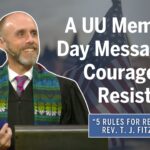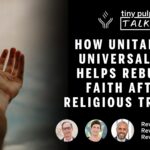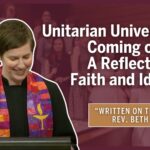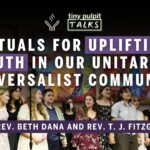Why Care? | Rev. Dr. Daniel Kanter | 04.21.24

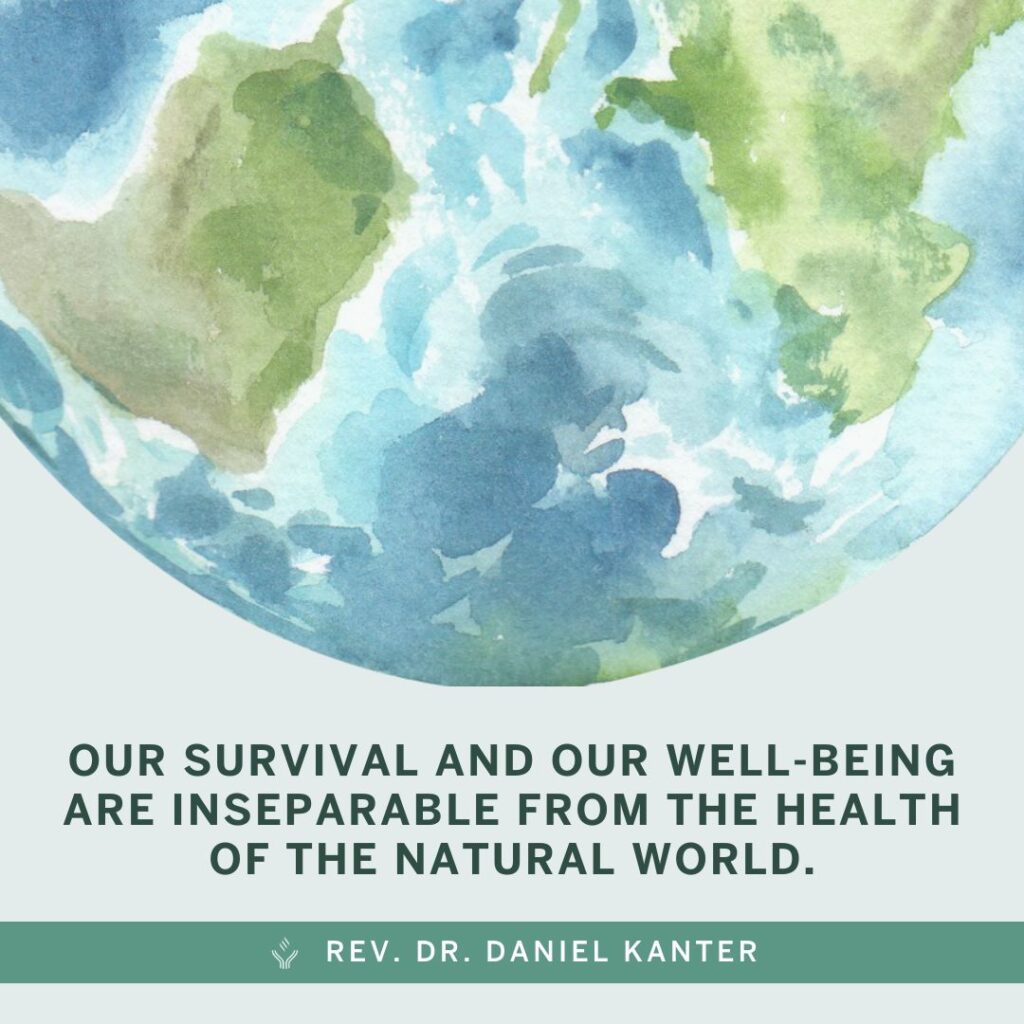
Sermon Transcript
Well, as I was preparing for this Earth Day, I was listening to Paul Winter’s Missa Gaia/Earth Mass. The soaring organ of St. John of the Divine in New York City filled my kitchen as the chorus sang, “All praise be yours through Brother Wolf. All praise be yours through Sister Whale. By Nature’s Song, my Lord be praised.” Oh, mystery. You are alive. I feel you all around. You are the fire in my heart. You are the holy sound. You are all of life. It is to you, I sing these wonderful words of praise and creation and earth and commitment to sea and to hear the sea and the wind and the creatures resounded through my house as I admired a swarm of cedar waxwing birds who migrate all the way from Costa Rica through Dallas and always stopped to eat the berries on my yaupon holly tree.
And all this majesty soaring through my home and my soul was interrupted by the arrival of the recycling truck clanging and bashing its way down the alley, filling its large belly with our cans and bottles and plastic containers from central market and last week’s Sunday times that floated up and down the alley all week. And I thought of this, this paradox that we exist in this amazing natural world and live in the mess of human creation. One only need to walk to the edge of White Rock Lake, the jewel of the city of Dallas to see the low flying ducks and the egrets and the herons hunting and the waves gloriously blown by the steady wind. But up close on the edge, we see the bottles and the styrofoam cups and maybe smell the waste dump that accidentally flowed down from Plano. Thank you Plano for that.
Recognizing our paradoxical existence
We don’t only feel the paradox, we smell the paradox.
“Oh, mystery. You are alive. I feel you all around Brother Wolf, Sister Whale. By nature, God is praised and we can’t extract ourselves very well from either this amazing beauty or the human imbalances that we have created.” We are humanity living in the environment on a planet in microclimates, in one giant ecosystem and in our own ways all over the world, protecting ourselves from the elements, seeking food to sustain each of our bodies out of the grasslands of Africa where we hunted and gathered. Now in the Amazon owned Whole Foods where we hunt and gather for bargains in places owned by billions, billionaires who charge us 4.99 for a pepper grown on a massive chemical induced farm picked by immigrants. Some government leaders want to extract and send back to horrendous places where people fight for food. Peppers trucked and flown and sent by train across thousands of miles so we can roast them or chop them for a salad.
And honestly, sometimes we barely taste them as they go down. This is a human reality. We cannot extract ourselves from such systems, although I know some try, but all in all, we are in this moment with the earth, some scary and some just unnecessary. And yes, it can feel to despairing to see the climate changing and feel as if we can do nothing. And yet some are finding solutions to our calamities. All is not lost. A historic moment slipped by us all on April 1st when the first ever global emissions levy was put on the shipping sector, the shipping sector accounts for 3% of global emissions and transports more than 90% of your boxes and your peppers and lettuce. Global trade, 90% and is regarded as one of the hardest industries to decarbonize because of the vast amounts of dirty fossil fuels ships burn each year, a levee finally placed on them.
Brother Wolf and Sister Whale says, “Thank you humanity.” And in March, work started just 12 miles from one of the world’s most dangerous borders of India and Pakistan. The Adani Green Energy Company’s new solar park will cover more than 200 square miles. It will likely be the world’s largest renewable park and when it’s finished, it should generate enough clean electricity to power 16 million Indian homes. Brother Eagle, Sister Loon, Brother Tiger, Sister Sea, Sister Flower, Brother Tree, let creatures all give thanks to thee. All is not lost, but Dallas and Plano, we can do better. Dallas, we throw away 86,000 tons of recyclables every year. If these items were actually recycled, nearly 50 million gallons of landfill and over a million cubic yards of landfill space could be saved. Think about that next time you’re standing over the garbage, the recycling, the garbage, the recycling.
I know we need even bigger solutions to these problems and I know that finding solutions to our environmental issues really isn’t my job. My job is to help us ponder what we can do and where our spirits meet real life. And with all the clanging symbols of the world on this topic and the calamity conversations and the doomsday clock and the predictions of more violent storms and weather related tragedies, there is reason for concern for sure, but human beings, it also starts with each of us, what we care about. By recognizing our interconnectedness with all living organisms, a stated Unitarian Universalist principle, and working towards conservation efforts, we can ensure a sustainable and harmonious future for both humanity and the natural world. Our survival and our well-being are inseparable from the health of the natural world.
Embracing Interconnectedness
The late E.O. Wilson, the biologist and naturalist and professor of entomology that Beth read widely seen as a leading thinker on our place in the natural firmly asserts that by acknowledging and valuing our interconnectedness with all living organisms, we can embark on a path toward conservation and sustainability.
He calls this concept ecosystem services. Ecosystem services are the benefits that humans receive from functioning ecosystems. These services are crucial for our quality of life and include the purification of air and water, the regulation of climate, and the provision of food and resources. Wilson highlights how these services are intricately tied to the interactions between species within ecosystems. Take for example, he says the bee-plant relationship. We all understand this, but we don’t think about it a lot. Bees are crucial pollinators and their interactions with flowers allow for the successful reproduction in countless plant species. This in turn ensures stable, productive agricultural systems that sustains our food supply. E.O. Wilson says, “By understanding and appreciating the interconnectedness between bees, flowers, and food production, we can prioritize the conservation of bees, safeguarding the provisions of the ecosystem services that we heavily rely upon.”
Wilson says, there is what he calls a biophilia, that humans have an innate instinctual affinity for other living organisms. He says that fostering a deep emotional connection with nature can inspire a sense of responsibility. Hear me parents especially, and motivate individuals to engage in conservation efforts. When we engage with nature, we form a bond with the natural world, a bond that can protect and preserve the beauty and diversity of the earth. Biophilia. As we immerse ourselves in the wonders of nature, we become deeply recognizable not only to nature, but we recognize ourselves intertwined with the well-being of other species, and we feel then compelled to take action and to create a sustainable and harmonious future. For the mountains, hills, and pastures and their silent majesty says the song, “For all life, for all nature, sing we are joyful praise to thee.” When we come to church and we hear songs like that, we’re not just trying to hear something nice, we’re trying change how we understand our connection with the earth and each other.
And this isn’t just some kind of woo-woo spirituality. This is life friends, this is our lives. The world is counting on our caring and challenging, especially extraction theologies that have been built over 2000 years. Biblical interpretations that have said, we are here to have dominion over the earth have to be deconstructed by us. To say that we are stewards of creation, listening to our Native American friends more than our evangelical friends. Dominion will not save us. Only stewardship will save us. To be stewards not extractors means we can’t miss the magnificent natural events that happen all around us all the time. Like the poet said, which Beth read, “I failed to notice the pearl gray moment just before sunrise when everything lightens, failed also to find birdsong and later walking through the woods to stop thinking, thinking even for five consecutive steps.” Unitarians, can you stop thinking for five steps?
This blurred life, the poet says, with only moments caught in attentions, loose sieve, tiny pearls fished out of the oblivion of sea, laid out here as offering or apology or thank you. The reason that poem is entitled, Failing at My Job, is that our job is to walk more carefully with the earth and what is natural. To be stewards requires us to stand on the shore of the lake and not only to ponder intellectually the amazing things that are happening above and below the water, but also to notice that we too are creatures of this creation meant to bond with the movements of the earth and all its forms.
Fostering a sense of shared responsibility and collective care
I’m not telling you anything you really don’t know, but I’m telling you something that you forget just like me all the time. I’m telling you that we are meant to grow toward and through the Unitarian Universalist value of interconnectedness that we all have work to do there. And yes, maybe humanity has a short time left. Maybe our destiny is to have a future living in ways that are more separated from nature than we already are. But just think about what happens when we connect ourselves to the natural world. What motivates us? I take Greta Thunberg as a model for this. She’s on our wayside pulpit right now. She’s a child shaming the world about our bad policies. When I was her age, I was more worried about the baseball scores and whether I could eat more than my siblings at dinner. Greta is raising a revolution and standing at the UN telling them we need a global response.
When I was her age, I couldn’t raise a goldfish. Mom, my goldfish died again, which I think I said many times. Well, we can do this. If she can do this, we can do this. We can connect our cares about the world to our actions, and yes, we have a huge hill to climb and honestly, we’re not getting off this hill. So the one thing we can do is deepen our spiritual responses to the natural world. Then we gain a deeper understanding of the significance of the ecosystem services that we impact and live by. By valuing the biodiversity, engaging in conservation efforts, fostering our sense of biophilia, we can work towards a future where humanity can coexist harmoniously with ecosystems that sustain us, to cherish and preserve the web of life, knowing that it holds the key to our own survival and prosperity.
Saint Francis in his scratchy brown woolen cassock in the year 1200 wrote, “Ask the beasts and they shall teach you the beauty of the earth. Ask of the trees and they shall teach you the beauty of the earth. Ask of the winds and they shall teach you the beauty of the earth. Ask of the flowers and they shall teach you the beauty of the earth.” Brother Sun, Sister Moon, friends, we are creation. Don’t let it get lost on you.
Your responsibility is to remember your animal nature, your connection, your impact, and your hopes that all matter. We sail along on this blue boat home, the song says, because we really have no alternative. Let us live like we know and let us sing as we know this very important lesson. And I would suggest to you, especially you over here, youth, that we change the lyrics of the hymn from I, I, I to we, we, we, to mine, mine, mine to ours, ours, ours because that is the only way we are going to live through this. The blue boat home says, “Give thanks to the waves. Hail the great winds urging us on,” in my interpretation. “Greet the infinite sea, sing the sky. The wide universe is the ocean. We travel and the earth is our blue, our blue boat home.” Maybe we should try to sing that. Amen.



